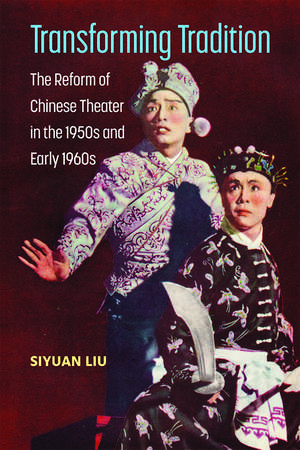Transforming Tradition: The Reform of Chinese Theater in the 1950s and Early 1960s
Autor Siyuan Liuen Limba Engleză Hardback – 21 iul 2021
Shortly after the establishment of the People’s Republic of China in 1949, the PRC launched a reform campaign that targeted traditional song and dance theater encompassing more than a hundred genres, collectively known as xiqu. Reformers censored or revised xiqu plays and techniques; reorganized star-based private troupes; reassigned the power to create plays from star actors to the newly created functions of playwright, director, and composer; and eliminated market-oriented functionaries such as agents. While the repertoire censorship ended in the 1980s, major reform elements have remained: many traditional scripts (or parts of them) are no longer in performance; actors whose physical memory of repertoire and acting techniques had been the center of play creation, have been superseded by directors, playwrights, and composers. The net result is significantly diminished repertoires and performance techniques, and the absence of star actors capable of creating their own performance styles through new signature plays that had traditionally been one of the hallmarks of a performance school. Transforming Tradition offers a systematic study of the effects of the comprehensive reform of traditional theater conducted in the 1950s and ’60s, and is based on a decade’s worth of exhaustive research of official archival documents, wide-ranging interviews, and contemporaneous publications, most of which have never previously been referenced in scholarly research.
Preț: 510.37 lei
Preț vechi: 630.09 lei
-19% Nou
Puncte Express: 766
Preț estimativ în valută:
97.66€ • 100.75$ • 81.50£
97.66€ • 100.75$ • 81.50£
Carte indisponibilă temporar
Doresc să fiu notificat când acest titlu va fi disponibil:
Se trimite...
Preluare comenzi: 021 569.72.76
Specificații
ISBN-13: 9780472132478
ISBN-10: 0472132474
Pagini: 472
Ilustrații: 43 illustrations
Dimensiuni: 152 x 229 x 33 mm
Greutate: 0.74 kg
Editura: UNIVERSITY OF MICHIGAN PRESS
Colecția University of Michigan Press
ISBN-10: 0472132474
Pagini: 472
Ilustrații: 43 illustrations
Dimensiuni: 152 x 229 x 33 mm
Greutate: 0.74 kg
Editura: UNIVERSITY OF MICHIGAN PRESS
Colecția University of Michigan Press
Notă biografică
Siyuan Liu is Associate Professor of Theater at the University of British Columbia.
Recenzii
"What is striking about this volume—which details the transformation of Chinese theater that started before the Communists took charge and continues still—is that it serves as the perfect template for all the revisions and changes that have occurred in the arts in China. Liu’s account of this radical reform is detailed and impressive. Recommended."
—CHOICE
—CHOICE
"...with Transforming Tradition Liu has brought us once again a tour de force of thoroughly committed, deeply multilayered, impeccably researched scholarship. His research continues to set the standard for historical studies of theater and the arts in modern China."
—The PRC History Review
—The PRC History Review
"Although the nuancing of vocabulary should serve as a model for all scholars writing on Chinese theatre in English, Liu’s book also has a quality far too rarely visible in academic publishing: passion. ...it serves as a model of how to write an engaging theatre history that involves both art and politics in equal measure."
—Theatre Survey
—Theatre Survey
"Transforming Tradition offers an excellent example of how a study of theatre history can include examinations of both textual products and the practitioner’s voice and body, and how such appraisals can effectively enhance each other. ...Transforming Tradition is a must-read for educators, researchers, students, and general readers who are interested in Chinese theatre history, Chinese cultural studies, theatre historiography, and the interplay between art and politics."
—Contemporary Theatre Review
—Contemporary Theatre Review
Siyuan Liu’s volume Transforming Tradition is a monumental study tracing the origin and development of the CCP-led xiqu reform campaign during the high socialist period. As Liu’s thorough and impeccably researched analysis shows, this largely top-down reform process resulted, within a relatively short time span of seventeen years, in a radical alteration of the nature of classical Chinese theater’s dramaturgies and performance methods as well as in mutilating what he terms “xiqu’s entire ecosystem” (329). The book provides a comprehensive documentary history of this phenomenon, which Liu interprets through a multifarious theoretical framework combining concepts of historicism, gentrification, and colonial modernity with “additional influences from Marxist materialism and the Soviet Union” (18).
"This book is invaluable because it not only enriches scholarly understanding of Chinese socialist theatre, but explains the decline of xiqu by offering the missing link between the prosperous Republican era and the radical model plays of the Cultural Revolution. This book is a must-read for students and scholars of Chinese theatre or modern Chinese history."
Descriere
Explores the history and lingering effects of governmental reform of Chinese theater, post-1949
